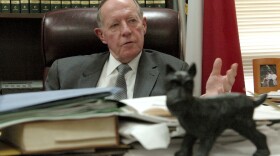North Carolina officials set a Sept. 10 date for a new election for the nation's last unresolved congressional race after the November results were thrown out over concerns of ballot tampering. Parties will hold their primaries on May 14.
The state elections board determined that a new election was needed in the 9th congressional district after hearing days of evidence that tended to show a political operative working for Republican candidate Mark Harris hired people to collect mail-in ballots. The board acted because ballots were vulnerable to being changed or discarded.
North Carolina law prohibits anyone other than a voter or immediate family member from handling a mail-in ballot.
Harris had narrowly led Democrat Dan McCready, but before the elections board refused to certify November's results pending an investigation. McCready is running again in the new election. Harris isn't, citing health problems.
The operative Harris sought out and lined up ahead of his 2018 Republican primary, Leslie McCrae Dowless, was charged last week with seven low-level felonies, including ballot possession and obstruction of justice. The charges involve Dowless' work for Harris in the 2018 Republican primary, for 9th district congressional candidate Todd Johnson in the 2016 primary, and other work he did in the 2016 general election.
Prosecutors are still investigating evidence of ballot tampering by Dowless and others during the November election for the 9th District, which includes part of Charlotte and extends eastward across several counties.
Harris has not been charged with a crime and has denied knowledge of any illegal practices by those involved with his campaign. But he too could come under scrutiny: He admitted in last month's board meeting to writing personal checks to Dowless in 2017, a potential violation if the payments weren't reported.
The North Carolina scandal represents the rare case of a federal election nullified and redone because of fraud.
In 1887, the U.S. House of Representatives vacated the seat Rhode Island's William Pirce seemingly won in November 1884 after evidence of fraud raised doubts about whether the Republican won a majority of votes, noted University of Minnesota research fellow Eric Ostermeier. The U.S. House Committee on Elections received sworn testimony from several voters who said they were paid $2 to $3 to back Pirce, Ostermeier said. A special election was held the next month and this time the Democrat, Charles Page, defeated Pirce and served for the final 10 days of that congressional session.
Sixty years earlier, election fraud — which Ostermeier said was far from rare in the 19th century — might have cost John Calhoon his initial win in a special House election. It's not clear why, but the votes from one central Kentucky county were thrown out in 1827 "owing to an irregularity," the U.S. House biography of Calhoon's rival, Thomas Chilton, states. Both men petitioned the governor for a redo election, which Chilton won. Calhoon would go on to serve four years in the House in the 1830s.
The House elections committee also voided the 1806 victory of John Culpepper in a North Carolina congressional district, Ostermeier said. The Federalist had been in Congress for nearly a year when the committee found irregularities in three of the district's five counties and concluded, "It is most proper to give the citizens of that district an opportunity to have another election."








